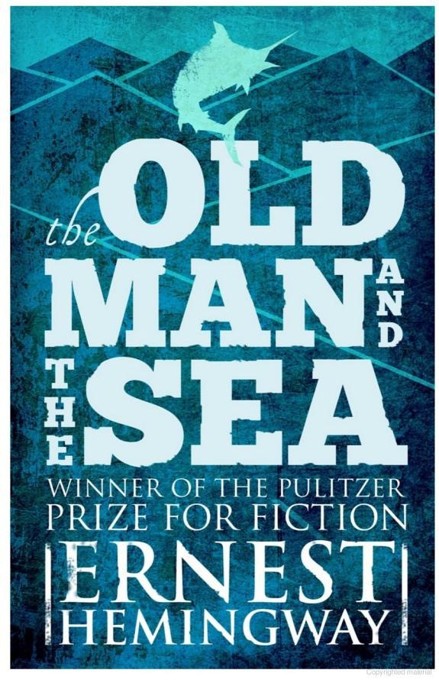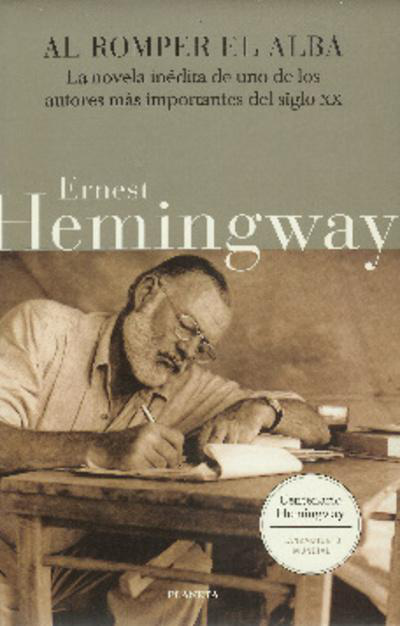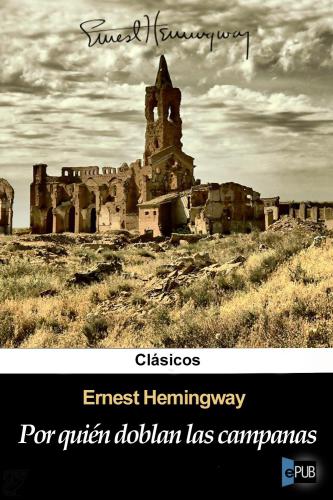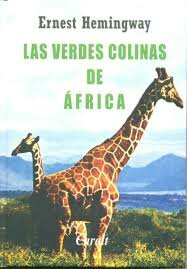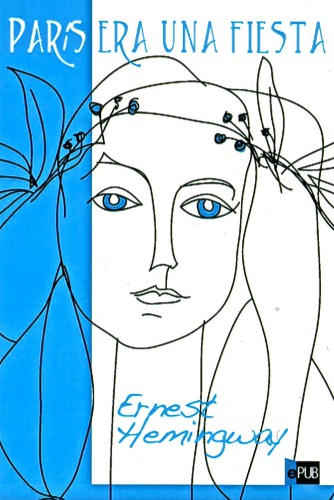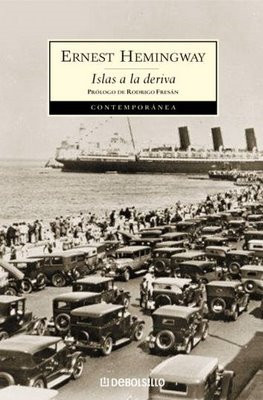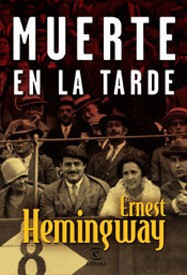oleebook.com
Short Stories de Hemingway_ Ernest
de Hemingway_ Ernest - G├®nero: English
Sinopsis
Hemingway, Ernest
Descargar
Descargar Short Stories ePub GratisLibros Recomendados - Relacionados
Rese├▒as Varias sobre este libro
There is a story, probably apocryphal, that Hemingway once bet that he could write an entire short story in six words. He was taken up on that bet, and produced the following diminutive masterpiece: "For Sale: baby shoes. Never used."
I to believe that story is true.
It's not possible to review the 49 stories in this book, which range in length from dozens of pages to a single paragraph. Actually, it is possible, but I'm just not the man to do it. So I'll just throw out some scattered thoughts:
- The Snows of Kilimanjaro was a little disappointing. I thought it was derivative of Bierce.
- The Short Happy Life of Francis Macomber is still as brutally awesome as it was in high school. Hemingway at his bitter, drunken, misogynistic best.
- The stories dance around sexuality a lot. Sometimes Hemingway is so discrete, you have to read the story twice to see between the lines. For instance, A Simple Inquiry involves an Italian major trying to seduce his orderly (or at least that's what I got out of it). On the other hand, there's a semi-graphic rape in Up in Michigan, and an extended conversation with three, three-hundred pound prostitutes in The Light of the World. I'm not sure why I mention this, other than that I'm a literalist. That is, I prefer an author who telegraphs to me that sex is occurring. So I don't miss it.
- Hemingway's treatment of women is uniformly shabby. At their best (I'm thinking Lady Ashley in The Sun Also Rises or Maria in For Whom the Bell Tolls) they either boldly use sex as a weapon or are paragons of Mary- purity. Most of the time, in this collection, they are prostitutes, seductresses, or objects to be discarded (speaking of discarded, The End of Something is a realistic little break-up scene). This is probably part of the reason why I've never said this to a woman: I've lost my underwear, can I see yours? Hey, you should read something by Hemingway.
- There is some good STD humor. One story is written as a letter by a woman to a doctor. The woman is asking about her husband's syphilis, which he contracted during his time in the military. STD humor is always funny, unless you have an STD.
Or this line, from A Very Short Story:
The major did not marry her in the spring, or any other time. Luz never got an answer to the letter to Chicago about it. A short time after he contracted gonorrhea from a sales girl in a loop department store while riding in a taxicab through Lincoln Park.
What a great way to end a story!
- There is a lot of dark humor, especially in An Alpine Idyll, where a husband makes odd use of his wife's corpse. But you can still enjoy this collection, even if you don't find the comic-gold in Weekend at Bernies.
- A lot of these stories follows the adventures of Nick Adams, Michigan boy. These were my favorite stories, especially Big Two-Hearted River: Part 1 & 2. Here, Hemingway pulls himself away from the elitist, intellectually-disillusioned expatriate shtick (where his characters are inevitably drunk and disillusioned in Italy, Spain, or Greece) and gives us some nice, detailed stories about hiking, camping, fishing, and cooking food over an open fire. I enjoyed this. It was reading a more misanthropic version of Norman Maclean's A River Runs Through It.
For example:
Nick took the line in his left hand and pulled the trout, thumping tiredly against the current, to the surface. His back was mottled the clear, water-over-gravel color, his side flashing in the sun. The rod under his right arm, Nick stooped, dipping his right hand into the current. He held the trout, never still, with his moist right hand, while he unhooked the barb from his mouth, then dropped him back into the stream...He's all right, Nick thought. He was only tired.
Parting thoughts: This collection is the short story equivalent of a frat house. It's all men, all the time. The only real love shown in any of the passages are between male friends. Most of the time, its booze, shotguns, hunting, fishing, talking about women, bullfighting, and participating in revolutions. In other words, all the stuff that men use to filter their love for other men, without being thought gay.
Of course, Hemingway might have disagreed. He might have insisted that this is really all about booze, shotguns, hunting, fishing, talking about women, bullfighting, and participating in revolutions. To that end, it still succeeds on a certain level.
But that is just my opinion, and it should be noted that I love my male friends, but also booze, shotguns, hunting, fishing, talking about women, bullfighting*, and participating in revolutions**. So I'm sort of the target audience.
* Bullfighting is when a man boxes a bull, right?
** I confess, I haven't actually participated in any revolutions. Oh, wait, does the sexual revolution count? Because I also did not participate in that either. classic-novels61 s Michael FinocchiaroAuthor 3 books5,871
Unfortunately, GR is not great on dealing with duplicate entries. As I don't want to lose the nice comment below, I'll just refer you to the real review is over here on Goodreads:
https://www.goodreads.com/review/show...american-20th-c fiction nobel-lit ...more37 s Nood-Lesse354 223
Che cosa significa saper scrivere?
Se qualcuno mi chiedesse che cosa significa saper scrivere, gli consiglierei di leggere i 49 racconti.
Ernesto aveva l’Afición per la realtà oltre a uno smisurato talento per descriverla. La sua prima lettura, tanti anni fa, la devo a un verso di Guccini “I nostri miti morti ormai, la scoperta di Hemingway, il sentirsi nuovi, le cose sognate e ora viste” La scoperta di Hemingway… Se non è troppo e non è troppo poco, se è un solo aggettivo ma è quello giusto, se vi dà l’idea di esser semplice, fruibile, reale, vicino, vostro… andate a controllare il nome sulla copertina.34 s sigurd204 33
Un giorno Hemingway disse che se avesse fatto un incontro di boxe di quindici riprese con Tolstoj ai punti avrebbe perso certamente; ma aggiunse che se però gli si dava l'opportunità di fare un incontro di solo poche riprese col conte, allora gliene avrebbe date di santa ragione, facendolo stramazzare a terra.
L'aneddoto non voleva essere solo simpatico. nascondeva una profonda convizione: Hem credeva di essere il numero uno in fatto di racconti. Ci sarebbe da discutere; magari a tavolo, con un sigaro dei suoi amici cubani, e un bel bicchiere di tequila bum bum.
Di certo leggendo "Colline come elefanti bianchi", non si può dargli tutti i torti. E' uno dei 49. Sono sì e no 5-6 pagine. Una ragazza e un fidanzato aspettano il treno, in una città spagnola. Lui vuole che lei abortisca. E' insistente come non mai. dice che la ama e che per lei farebbe qualunque cosa. al che lei risponde: "vorresti per piacere per piacere per piacere per piacere per piacere per piacere per piacere smettere di parlare?" sono 7 per piacere, tanti direste voi, non tanti direi io. Si intuisce che è il capolinea. Sullo sfondo ci sono delle colline "come elefanti bianchi" dice lei. Ma lui non capisce.
Gli elefanti bianchi sono il dono che i siamesi facevano ai loro cortigiani, i quali si rovinavono per mantenerli. Nel libro diviene quindi metafora incisiva, quegli elefanti bianchi diventano emblema dei bambini non voluti, metafora di quelle relazioni troppo dispendiose emotivamente se l'uomo non ne è all'altezza.
E' un bel gancio destro.32 s Evi *371 268
In questa raccolta ci sono due dei migliori racconti che non solo Hemingway abbia scritto ma che in generale siano mai stati scritti: La breve vita felice di Francis Macomber e Le nevi del Kilimangiaro.
La raccolta vale anche solo per questi due capolavori di perfezione narrativa.
Sono come un distillato di un romanzo, conclusi, non una parola di troppo n├® una di meno, n├® una che vorresti sostituire.
L'ambientazione di entrambi è casualmente uguale, un classico di Hemingway: l’Africa, due episodi di safari dove l’esperienza della caccia diventa una metafora della morte, un modo per l’autore per cercare di sconfiggerne l’ossessione, tutto dentro la cornice di una natura aspra e suggestiva intorno alla quale Hemigway avrebbe potuto calcare la mano, facile quando il paesaggio offre un destro così agile, e invece mantiene il controllo della scrittura senza strafare, ma con due colpi di pennello descrive un luogo, ed è come se d’un tratto ci si trovasse lì.
Se i due racconti che ho citato sono auto concludenti e lo scrittore offre tutti gli elementi di comprensione al lettore in altri Hemingway è effettivamente un po' irritante, questo accade quando utilizza abbondantemente l’espediente stilistico che chiamava il principio dell'iceberg:
I sette ottavi di ogni parte visibile sono sempre sommersi. Tutto quel che conosco è materiale che posso eliminare, lasciare sott’acqua, così il mio iceberg sarà sempre più solido. L’importante è quel che non si vede
In questi casi si ha quasi la sensazione che le storie non siano state scritte per chi legge ma per qualcuno di privilegiato con cui l’autore ha cominciato un discorso e che è l’unico in grado di capire al volo e senza bisogno di spiegazioni, il lettore medio invece si sente tagliato fuori, un po’ come quando si è ospiti in un luogo in cui non si è ben accetti.
In questi racconti Hemingway non fa alcuno sforzo per chiarire i personaggi, i luoghi, le situazioni, l’antefatto. E’ una sensazione straniante, quando Hemingway fa così vorrei bonariamente prenderlo a sberle, ma è anche un aspetto che lo distingue da tanti altri scrittori.
I temi dei 49 sono i temi cari all'autore americano: la guerra, raramente per├▓ in azione diretta di combattimento sempre soprattutto in episodi collaterali all┬Æesperienza militare in s├® e molti ambientati in Italia, in Veneto, dove lo scrittore combatt├¿ nella Grande Guerra, e qualcuno anche a Milano cosa che mi ha doppiamente fatto felice; molti altri riguardano il mondo delle corride dove si esalta il coraggio ambivalente fra i duellanti toro e torero; ci sono racconti sul pugilato; immancabili e, cos├¼ autobiografici, quelli dedicati alla caccia nei boschi e alla pesca nei torrenti. Certo a me la pesca piace, ho sempre avuto a che fare con pescatori, e della pesca amo la meticolosa preparazione che sta dietro, il rituale, la tecnica, l┬Æatteggiamento predisposto ad una placida attesa, e la concitazione orgasmatica dell┬Æabboccamento, ma comunque non serve amare la pesca per poterli apprezzare, n├® essere pro o contro la corrida per percepire comunque la profonda bellezza narrativa.
C’è poi il ciclo di storie che ha per protagonista Nick Adams alter ego dell’autore e che fanno capire molto sia di Hemingway uomo che di Hemigway scrittore.
I 49 sono racconti molto maschili (se ├¿ concesso usare una distinzione di genere) e non solo perch├® le donne sono sempre un po┬Æ marginali, e questo corrobora l┬Æaccusa di misoginia che spesso gli viene attribuita, ma anche a rimarcare che si pu├▓ essere un grande autore di racconti anche dimenticando per un po┬Æ il punto di vista femminile.
Sono insomma quasi tutti grandi racconti, e di grande varietà di temi, come disse lo stesso Hemingway:
In questo libro ci sono racconti di ogni genere, spero che ne troverete qualcuno che vi piace.
A me è successo.letteratura-americana racconti26 s Tamoghna Biswas309 123
**4.5 stars**
"Ah. madame, it is years since I added the wow to the end of a story."
(Ernest Hemingway, Death in The Afternoon)
I remember reading the phrase: "A world of experience", when I was planning to buy this book. And now, I guess I totally agree with it. And as this was my first Hemingway read at a time when I didn't even bother to know his 'iceberg theory' and all, I thought (simply) that I had bought a retold version of the book, lucid as his writing is. What is the problem of those pseudo-intellectual critics with his writing, I don't know. I don't care to know.
Talking in big words as a contrary to the author himself, His stories can be better thought as surveys of the utter disaster which had brought humanity to ruin and laid the foundations for a period of unmitigated spiritual decay which became the symptoms of the ills of our times.
On a personal note, the best bit of Hemingway is that whenever I struggle to finish one of his tragic stories, I visualize him standing in front of me, pointing his shot gun and saying: "Look up you son of a weakling. Don't you dare leave my story when you are only halfway through. For I don't think you can turn away from it all, least of all in your real life. For that's the f**king reality!"
(God knows, I would have been personally quite intimidated by him had I known him in person).
You don't expect miracles in Hemingway's stories. And that's the reason why his stories are miraculous. There are heart-warming stories 'A Day's Wait', whereas there are heart-wrenching stories 'The Snows of Kilimanjaro'. Practically I bought the book for the latter, and it's probably one of the best short-yet-not-too-short stories I have, or will ever come across. In general the characters of the stories are the individuals who have resigned themselves from the general community because of emotional and spiritual disillusionments. And better of the stories, 'Cat in the Rain', 'Out of Season' usually follow a drifting purposeless course. And the attention is mostly, in general concentrated on the Man in a state of alienation.
I didn't rate it five, only because I didn't get all of his stories entirely. Particularly 'Up in Michigan'. I didn't get the hang of it. Probably that's entirely my fault. Once I get them all, it will be 5. I rarely came across a collection with hardly any flaws.
"There is much more behind Hemingway's form than people know."—James Joyce22 s Conrad200 371
The conventional wisdom is that Hemingway wrote short, choppy sentences and was fundamentally a bloodthirsty person, possibly as a consequence of insecurity about his masculinity. I don't think either is quite true.
As for the first point, I just don't find it to be anything but a stereotype perpetuated by people who haven't read him very carefully. Hemingway wrote a lot of sentences the length of which would have made Faulkner envious (though Faulkner was fond of the short, choppy sentences people usually give Papa Ernest credit for... but I digress). One of his favorite tricks (particularly when writing about Africa) was to go from a landscape to a single person and back again in the context of a single sentence. Not really the habit of a devout minimalist.
As for the second point, I can understand people's misgivings about Hemingway's hypermasculine posing, but ask yourself this: why would an unquestioning misogynist write "Hills White Elephants?" Would there be much of a point (if that was your worldview) in going on and on about what castrating shitheels women can be? He did write some terrible female characters, but he also explored the corrosive effects of isolation from women on the male psyche (I'm thinking here of the story about Nick Adams' wartime experiences.) As for the violence, in Hemingway's short fiction it usually consists of exhilaration alloyed with horror. People also occasionally portray him as an opportunistic war tourist, but it was no small feat joining the Lincoln Brigades during the Spanish civil war, and he should get a lot of credit for having done so.
[Oops. After having written this I had this nagging sense of having been wrong, and I was: Hemingway was an ambulance driver in WWI before having been a writer, and was wounded; he was then a reporter during the Spanish Civil War, and World War II and was wounded more than once in each.]
In (I think) "The Short, Happy Life of Francis Macomber" one of the macho characters Hemingway was widely noted for says something , "When you jaw things up too much, they lose their meaning." And yet it's a long and fairly verbose story. Hemingway's writing was at war with itself, and I think he should be given the benefit of the doubt, particularly in his early short fiction, before he settled into his tics. Short works mercifully deprive him of the chance to underinterpret female motive, and I think his best stories are sometimes the snapshot- vignettes.
Anyway, this collection of shorts is exemplary and worth reading, even if it's not everyone's cup of tea. Can't remember how many of the Nick Adams stories are in here, but those are my favorites, alongside "Hills", "Kilimanjaro", "Macomber", and this great one about a child watching his father attempt to deliver a baby. There's a lot of peevishness that goes around about Hemingway, and it's a shame - at the same time as he reified masculinity he also detested the burdens it placed on him, the same way he both enjoyed the perils of warfare and recoiled at its reality. That attitude might be a cliche now, but it wasn't when Ernest invented it.fiction read-in-high-school22 s Ulysse330 152
Ottantanove
There was a man called Hemingway
A hunter by night and by day
On his very last chase
He tracked down his own face
And shot the thing dead—Oy vey!
A sinistra... / A destra...
.2014 books-that-inspire-limericks short-stories-tales-novellas17 s Sandra937 280
Se dovessi fare, per gioco, una graduatoria dei racconti che pi├╣ mi sono piaciuti, al primo posto metterei senza dubbio i racconti di Cechov, certo non tutti sono perfetti ma in generale i racconti del medico russo sono splendidi. Accanto ad essi metterei i racconti di Salinger, da I nove racconti ad Alzate l┬Æarchitrave carpentieri e Seymour introduzione fino a Franny e Zooey, che di fatto sono due racconti: di Salinger i miei racconti preferiti sono Un giorno ideale per i pesci banana e Per Esm├®:con amore e squallore.
Poi metterei i racconti di Hemingway: i miei preferiti sono La breve vita felice di Francis Macomber, La capitale del mondo, Il mio vecchio, Colline come elefanti bianchi, Una gara a inseguimento, Padri e figli. I temi sono vari: vi sono racconti che parlano di caccia, di pesca, di amicizie maschili, e poi di corride, di boxe, di safari, di guerra, altri di coppie senza amore, o di gattini abbandonati sotto la pioggia. Sono racconti universali, che parlano a ognuno di noi e di ognuno di noi, maschi e femmine grazie ad indimenticabili personaggi maschili –mi viene in mente il giovanissimo Paco, cameriere che vorrebbe diventare torero, protagonista del racconto La capitale del mondo- e a meno riusciti ma pur sempre efficaci femminili, quale la protagonista di Colline come elefanti bianchi.
racconti usa14 s Carol StormAuthor 28 books213
If you read only one book by Ernest Hemingway, by all means read this one. These are all short stories, and some of them are only a few sentences long, while others are short novellas.
The most famous stories in this collection are classics "The Short Happy Life of Francis Macomber," "Snows of Kilomanjaro," "A Clean Well-Lighted Place," "The Undefeated," and "Fifty Grand." These stories date from Hemingway's celebrity period when he traveled the world hunting big game and making love to beautiful women. But my personal favorites are the earlier stories, "My Old Man," and the ones from when he was a young World War One Veteran, "Big Two Hearted River" and "Soldiers Home," or even the stories about being a teenager in rural Michigan, "The Battler," "The Killers," and "The Three Day Blow."
No matter what kind of story you , you can't go wrong with this amazing collection!11 s Dorin285 80
What is clear from this collection is that Hemingway was a great storyteller. He could tell a story in just a few sentences. Not all forty-nine of them were to my liking, as it is only normal, but there are some good ones in this bag. War, fighting, boxing, drinking, fishing, hunting, travelling, whoring, bullfighting, these are the main themes.
I do not know why I Hemingway so much. Perhaps is the modesty and the simpleness of his writing which, unexpectedly, make up a very rich style. I haven’t found anyone else who could in a few short sentences, with simple, ordinary words, tell so much.
“Nick said nothing. The liquor had all died out of him and left him alone. Bill wasn’t there. He wasn’t sitting in front of the fire or going fishing tomorrow with Bill and his dad or anything. He wasn’t drunk. It was all gone. All he knew was that he had once had Marjorie and that he had lost her. She was gone and he had sent her away. That was all that mattered. He might never see her again. Probably never would. It was all gone, finished.”
“The boys at first were very polite about my medals and asked me what I had done to get them. I showed them the papers, which were written in very beautiful language and full of fratellanza and abnegazione, but which really said, with the adjectives removed, that I had been given the medals because I was an American. After that their manner changed a little toward me, although I was their friend against outsiders. I was a friend, but I was never really one of them after they had read the citations, because it had been different with them and they had done very different things to get their medals. I had been wounded, it was true; but we all knew that being wounded, after all, was really an accident. I was never ashamed of the ribbons, though, and sometimes, after the cocktail hour, I would imagine myself having done all the things they had done to get their medals; but walking home at night through the empty streets with the cold wind and all the shops closed, trying to keep near the street lights, I knew that Ì would never have done such things, and I was very much afraid to die, and often lay in bed at night by myself, afraid to die and wondering how I would be when back to the front again.”
“The road of the pass was hard and smooth and not yet dusty in the early morning. Below were the hills with oak and chestnut trees, and far away was the sea. On the other side were snowy mountains.”
If I had to choose some: The Three-Day Blow, Big Two-Hearted River: Part 1, Che ti dice la Patria?, Homage to Switzerland.books-i-own nobel-authors north-america9 s Shankar181 4
An excellent introduction to this famous author. And his style. Each story is an interesting anecdote about a set of events about individuals in curious situations.
The stories by themselves appear to have no start or end but expose ways of thinking about each instance.
A lieutenant who wants to kill one of his soldiers who has ( in his mind ) been fatally wounded but the military doctor attending to him prevents him.
A Mexican who has been shot “accidentally 8 times” and does not know who may have done it. When he is a gambler who has just won a large amount recently.
Maybe it’s just the way writing was expected to be so - but almost every story had significant references to alcohol and drinking. I almost felt drunk with each story with frequent anecdotes about its effects and it’s need by the characters.
8 s Procyon Lotor650 103
Cos? ricolmi d'idee da essere cinquanta. Poche cose invecchiano come i gadget, gli aggeggi, le cornicine, le passamanerie civiche??? e non. I colori. In genere gli attributi. Ma gli attributi danno sostanza. Per secoli il procedimento di ripulitura, di sfrondatura, di eliminazione ha illuso moltitudini che fosse la strada per giungere all'Essere. Essere che una volta ridotto all'essenza, diventava oggetto dannatamente ostico per discorrervi sopra, cos? ostico da non poterci dire praticamente nulla, dimostrandosi cos? che l'Essere ? il nulla. Hemingway su quella strada procedette a lungo ma si ferm? prima, se ne accorse dove si arrivava: "Di cosa aveva paura? Non era n? paura n? timore. Era un niente che conosceva troppo bene. Era tutto un niente, e anche un uomo era niente. Era soltanto questo, e tutto quello che ci voleva era la luce, e un certo ordine e una certa pulizia. Alcuni ci vivevano e non lo avvertivano mai, ma lui sapeva che era tutto nada y pues nada y nada y pues nada. Nada nostro che sei nel nada, nada sia il nome tuo il regno tuo nada sia la tua volont? nada in nada come in nada. Dacci questo nada il nostro nada quotidiano e nadaci il nostro nada come noi nadiamo i nostri nada e non nadarci in nada ma liberaci dal nada; pues nada. Ave niente pieno di niente, niente sia con te." Per cui si ferm?. Rimase agli elementi minimi delle relazioni, delle cose serie della vita, del carattere e ne parla qui. Il racconto ? un alto strumento tendente al freddo, e si dice che per i suoi limiti stringenti sia la forma pi? divinamente difficile. Da molti decenni, presso gli altissimi vertici ci sono questi quarantanove, per molti lettori oracoli, odori, lampi sull'anima dell'uomo. Da qualche parte ? sepolta la carcassa rinsecchita dell'autore. Nessuno ha saputo spiegare cosa cercasse lo scrittore a quell'altitudine. Ho perfino letto che c'? chi li definisce, oltre che "di bruttezza imbarazzante", "un concentrato di maschilismo, fascismo, antropocentrismo, spirito reazionario, da muovere al disgusto." Per?! Chiss? con quale lista di attributi si definirebbe l'autore col viscere cagionevole. Temo che siano questo genere di giudizi ad impedire allo spirito maschilista fascista antropocentrico reazionario a passare definitivamente di moda. La soddisfazione di non darla vinta a chi con queste ideone si catafotte da solo nella gehenna, anzi a fargli cos? rabbia da svitare i denti dalle gengive, non ha prezzo. Ma come si chiameranno quelli che vedono ovunque lo spirito fascioantropocentricoreazionarmaschilista? Ce l'ho sulla punta della demoplutogiudomassonica tastiera, ma no, proprio non mi viene in mente. E dire che lo sapevo lo. Dannata mezzet?. Gi? cede la memoria, aiuto! Colonna sonora: Miles Davis ? A Different Kind Of Blue dvd.03-avventura7 s Rosanna 458 26 Read
- Sono in un bel guaio
- In che senso?
- In quello pi├╣ ovvio, quello del non sapere
- Solo?
- E anche del non capire
- Chi?
- I Grandi
- I Grandi puoi solo osservarli nella loro grandezza, se li capissi non lo sarebbero pi├╣, almeno per te
- Per├▓ vorrei...
- Fare una cosa che non serve fare, poi! goditi la lettura e non rompere il c...a nessuno, tanto meno a Loro
- Qualcosa devo fare
- Una puoi farla: guardare quegli occhi belli e quella bella bocca sulla copertina del libro e dire quello che pensi dei suoi racconti. Sii breve, però, ch'è già morto! In una sola parola?
- MURETTO
Oh, al diavolo!
Ho capito da me che questo è solo un gioco: appollaiata lassù la vista abbraccia un solo mondo fin dove è possibile, la prospettiva cambia e tutto si trasforma, che si sia al buio o in pieno sole, piovano lacrime o trilli di cuccioli e fatine!
Ho solo delle opinioni su questo libro, pensieri, che annotavo man mano ovunque. Li riporto, pari pari:
- Visione maschia della vita
- Maschio che osserva altri maschi
- A volte è la trascrizione dei dialoghi che egli ascolta o a cui partecipa, ma che io non ascolto, a cui non parteciperò mai. E' importante l'empatia mentre leggo: ne sarò sprovvista?
- Di certo sono istantanee: fotografie raccontate.
- Pensieri espressi direttamente in dialoghi.
Non tutto mi è piaciuto, per esempio 'Cinquanta bigliettoni' non sono proprio riuscita a leggerlo! e quanti aggettivi mi sono appuntata alla fine di ogni racconto: brutto, ottimo, bello, crudo, istruttivo, tragico, noioso, orribile, spiazzante, insinuante...di alcuni ho addirittura immaginato scenario e fine diversi, caro il mio H.
E poi cosa sono questi brevi capitoletti in corsivo?
Ho sospettato, ad un certo punto, che ci fossero nascosti nei racconti altri racconti e che un'unica storia dovessi saper leggere: la Sua. Un giochino letterario geniale!
E proprio quando cominciavo a star bene, gambe penzoloni...paffete! giù per terra...non sono proprio capace di star là sopra più a lungo...!8 s Simona936 212
In questo libro, come nei precedenti che ho letto, c'è lo zampino di quella grande donna che risponde al nome di Fernanda Pivano. Ogni libro che consiglia è una chicca di sublime bellezza e questo ne è la dimostrazione.
Ho viaggiato con Hemingway in Spagna in mezzo ai tori e alle corride, nella Parigi che in alcune scene, mi ricordava "Midnight in Paris", nella Milano delle corse al trotto, a Roma, nell'Africa dei cacciatori, insomma, in tutti i luoghi cari a Hemingway.
"I 49 racconti" che Hemingway presenta sono ricchi di bellezza, a tratti struggente, di poesia. Un vero e proprio spaccato di vita dell'universo di Ernest Hemingway. 8 s Maria Di Biase314 74
Soltanto lo scrittore "che ha cambiato il modo di scrivere di tutto il mondo".
Leggere i Quarantanove di Hemingway è stato come riascoltare tutti gli scrittori che avevo conosciuto esprimersi attraverso una sola voce. In Colline come elefanti bianchi, uno dei miei racconti preferiti, si ha l'impressione di leggere un primo Raymond Carver. C'è tutta la delizia del testo sotto al testo, quei rivoli quotidiani che si incagliano nelle apparenze di dialoghi innocui e ordinari.
http://www.scratchbook.net/2015/05/he...racconti8 s Dave Russell73 119
What I've read so far (possible spoilers):
THE SHORT, HAPPY LIFE OF FRANCIS MACOMBER
A man has the good sense to run away from a charging lion, and because of that, his wife sleeps with another man who bears a physical resemblance to Hemingway.
CAPITAL OF THE WORLD
A waiter and dishwasher are fooling around, pretending to be a bull and matador, and the waiter ends up with a knife in his femoral artery. I wonder if Hemingway were alive he would be writing stirring stories about the courage of those guys on Jackass.
THE SNOWS OF KILIMANJARO
This is a terrific story (aside from the dig at Fitzgerald.) I love the wide open ending.
OLD MAN AT THE BRIDGE
Old man--check. Bridge--check.
UP IN MICHIGAN
ON THE QUAI AT SMYRNA
INDIAN CAMP
THE DOCTOR AND THE DOCTOR'S WIFE
THE END OF SOMETHING
THE THREE-DAY BLOW
It's been three days since I read this one and it still blows.
THE BATTLER
A VERY SHORT STORY
The title doesn't lie.
SOLDIER'S HOME
I read this in High School, but had forgotten how good it is. When you've seen enough death the business of living seems so unimportant.
THE REVOLUTIONIST
MR. AND MRS. ELLIOT
CAT IN THE RAIN
OUT OF SEASON
CROSS-COUNTRY SNOW
MY OLD MAN
BIG TWO-HEARTED RIVER: PARTS I AND II
A guy catches two fish. Big ones.
THE UNDEFEATED
A man is torturing a bull to death, but the crowd boos him because he's kind of botching it.
IN ANOTHER COUNTRY
I think Hemingway is at his best (here and in SOLDIER'S HOME) when he describes what happens to people after they've faced violence. They no longer belong to the world the rest of us do.
HILLS LIKE WHITE ELEPHANTS
Can someone tell me what this story is about? What operation?
THE KILLERS
CHE TI DICE LA PATRIA?
FIFTY GRAND
A SIMPLE ENQUIRY
TEN INDIANS
A CANARY FOR ONE
AN ALPINE IDYLL
A PURSUIT RACE
TODAY IS FRIDAY
What the hell? Weirdness. After a hard day of crucifying Christ three Roman soldiers hang out at a wine bar run by a Hebrew man named George.
A BANAL STORY
NOW I LAY ME
AFTER THE STORM
A CLEAN, WELL-LIGHTED PLACE
Another story I read in HS and had forgotten how good it was.
THE LIGHT OF THE WORLD
Another wonderfully tender story about how terribly lonely the world can be.
GOD REST YE MERRY, GENTLEMEN
I always thought the comma goes before "Merry." The things you learn.
THE SEA CHANGE
A WAY YOU'LL NEVER BE
THE MOTHER OF A QUEEN
ONE READER WRITES
HOMAGE TO SWITZERLAND
A DAY'S WAIT
A NATURAL HISTORY OF THE DEAD
Contrary to what those Weekend at Bernie's movies try to tell you, death is no fun. No fun at all.
THE WINE OF WYOMING
THE GAMBLER, THE NUN, AND THE RADIO
I don't remember reading this before, but it is my favorite story in this collection. Luck, prayer, the opium of the masses, and the futility of it all.
FATHERS AND SONS
short-stories7 s Jacob16 4
I have only read Hemingway's short stories but I feel I am content with that for now. Their length seems completely adequate for his writing style. I was introduced to him in my junior year of high school when the teacher asked us to read and discuss Hills White Elephants. It seemed to stretch on forever with cryptic, emotional dialogue between the two sole characters who are waiting at a train station, peppered with bits of internal narrative describing the opposing landscapes on either side (one is lush and green while the other is hilly with white sand). You come to find out that the narrative is cluing you in on the topic of their conversation. I had not read anything quite that before and it really turned me on my ear about the potential of literature. This is a great book if you feel investing your mind in stories about the surprisingly important minute details of life.7 s Dvd (#)467 83
07/09/2020 (****)
Stile inconfondibile, in questi racconti brevi e brevissimi c'è la quintessenza di Hemingway.
Può non piacere, ovviamente, e come tutte le raccolte di racconti anche questa sconta la varietà di ambientazioni e generi e, più in generale, il fatto di presentare insieme cose più riuscite e altre meno.
La media qualitativa dei racconti rimane alta, altissima in alcuni per coinvolgimento emotivo del lettore e potenza narrativa.
Lo stile di Hemingway, come detto, è inconfondibile: sintassi secca, narrazione asciutta fino a mostrare il biancore delle ossa della trama, la quale svanisce e si stempera nell'indeterminatezza del contorno. L'attenzione è sempre rivolta e focalizzata, alternandosi con stacchi repentini dagli uni agli altri, ai dialoghi e ai paesaggi: i primi servono per inquadrare senza fronzoli o orpelli i personaggi e farne risaltare la psicologia; i secondi per far decantare e emergere nei pensieri dei personaggi stessi quanto emerso nel corso dei rapidi scambi di battute. Tutto avviene con secchezza, con economia di parole e emozioni, per non dire una virgola più di quanto si deve dire, in sequenze che alternano leggerezza e dramma, ironia e mestizia.
Alcuni racconti emergono sugli altri, Le nevi del Kilimangiaro e quelli con protagonista l'alter ego di Hemingway, Nick Adams, in particolare.
C'è molta Spagna, e moltissime corride, e la cosa non stupirà: il modo in cui Hemingway racconta questo barbaro e tremendo passatempo rimane comunque affascinante e formidabile.
C'è anche molta Italia e, probabilmente, è l'Italia l'ambientazione che più volte ritorna dopo gli Stati Uniti. Anche qui, nessuna sorpresa, nemmeno sul fatto che molti di questi racconti narrino di fatti di guerra, ricordi giovanili del fronte del Piave.narrativa-americana6 s PleaseJustLetMeRead1,026 30
Selvom der s├ªdvanligvis kan v├ªre LANGT i mellem at jeg l├ªser noveller (trods min uddannelse som dansk- og engelskl├ªrer), r├©r Hemingways noveller mig dybt, og de h├©rer til blandt dem, jeg med gl├ªde vender tilbage til ad flere omgange, - jeg opdager noget nyt hver gang, og flere og flere detaljer dukker frem og ser dagens lys.6 s Lothrandir51 3
Con Hemingway me pasa algo curioso. A priori, no es el estilo que m├ís me gusta. Suelo ser algo m├ís recargado. Sin embargo, el estilo de este autor me fascina, me atrae de forma inexorable, y a m├¡ mismo me sorprende. Su econom├¡a a la hora de escribir, su empleo abundante de di├ílogos, deber├¡a ser algo que provocara mi rechazo; sin embargo, ocurre todo lo contrario. Desde mis primeros contactos con Hemingway, ador├® su forma de escribir, y algunos de sus relatos, como el de ┬ôEl gato bajo la lluvia┬ö, ┬ôLas nieves del Kilimanjaro┬ö, ┬ôLa breve vida feliz de Francis Macomber┬ö, ┬ôEn el muelle de Esmirna┬ö, o ┬¿Los asesinos┬ö, son de mis favoritos de todos los tiempos. Recomiendo esta colecci├│n de relatos a todos los que, independientemente de si les gusta un estilo m├ís austero o m├ís recargado, aman el relato corto. Creo que el Hemingway cuentista es, sin duda y como dice Garc├¡a M├írquez ┬ùun autor al que adoro┬ù en su maravillosa introducci├│n, el Maestro.le├¡dos-20205 s Ed Kay87
Got this mainly for the boxing story "Fifty Grand", which was excellent. Unfortunately I'm not a fan of the 'nothing happens' variety of short story that make up 90% of this book. Sure, Hemingway's spare prose might be good, but when it services inconsequential tales filled with faint characters, there's just not much to enjoy.5 s piperitapitta997 395 Read
A me Hemingway non piace
D'accordo non si pu├▓ dire avendone letto solo i racconti, anche se 49 :-)
anche perch├® i racconti in genere non ├¿ che mi piacciano molto.
Seconda chance anche per Ernst!
Fiesta o Addio alle armi?
Si accettano consigli!autori-usa letteratura-usa racconti5 s Saiful Sourav101 73
I read many of Hemingway stories from this edition. And then he becomes one of my favorites.favorites never-finished story4 s Janith Pathirage561 11
This was an entertaining book to read. Some stories in this anthology are pretty good and some are quite ordinary. You'll come across boxers, bull riders, Contract killers and all kinds of different characters in these stories. You'll come across some great / ambitious short stories "The Short Happy Life of Francis Macomber" and "Snows of Kilomanjaro" and then there are few stories anybody with a pen and a paper could have written. They will make you question whether these stories were written by a Noble Prize winning author. I guess that's what's unique about Hemingway's writing style. "The Indian Camp" is a good example. It's merely an incident but there's something magical about it.4 s Andra Buzatu129 21
Probabil aceste povestiri arata cel mai bine cine a fost Hemingway. Fiecare pare ca poarta macar o mica urma autobiografica, desi poate nu asta a fost intentia autorului.
Unele povestiri par usor misogine pe alocuri ceea ce se subscrie si mai mult biografiei autorului, dar i-am trecut cu vederea acest mic “defect”.
Ele mi-au dat imboldul sa mai incerc totusi sa citesc un roman de-al lui Ernest Hemingway.clasice literatura-americana povestiri ...more4 s Yuichiro38 1 follower
I've read this book before and I'm reading it again. Hemingway writes exceptional short stories. There are some Nick Adams Stories I've enjoyed. Also there is "The Short Happy Life of Francis Macomber." It's one of my favorite Hemingway short story. The story is very macho and is about hunting big game. Both subjects are very much out of fashion but I the story anyway.4 s Antonio Fanelli957 179
Piccole perle narrative.
La grandezza di un autore in storie brevi e fulminanti.
Uno stile non ancora eguagliato.4 s Tittirossa1,013 284
The best.
Breve la vita felice di Francis Macomber. 03-best-1004 s Sebastián Ocampo163 53
Autor del comentario:
=================================
